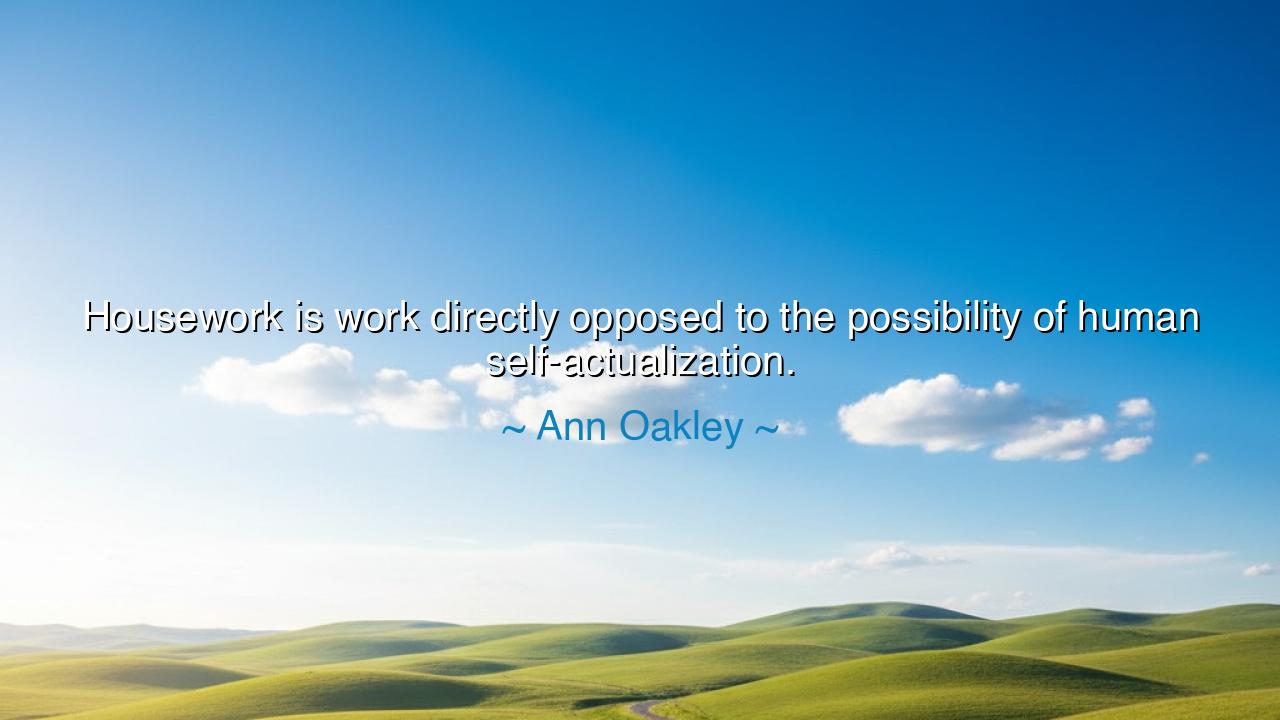
Housework is work directly opposed to the possibility of human






When Ann Oakley declares, “Housework is work directly opposed to the possibility of human self-actualization,” she speaks as one unveiling the hidden chains of domestic labor. Her words strike at the heart of an ancient injustice, where countless lives — most often the lives of women — have been consumed by duties that maintain existence but deny growth. To name housework as an obstacle to self-actualization is to reveal that endless cycles of cleaning, cooking, and mending, though necessary, can imprison the spirit rather than set it free.
The origin of this truth lies in Oakley’s pioneering studies of gender and labor in the twentieth century. She looked upon the daily toil of the household not with sentimental eyes, but with the clear vision of a sociologist, discerning how it bound women to invisibility. Her words arose in a time when the cry for equality demanded that unseen burdens be named, and that the value of work be measured not only by survival, but by its power to nurture the soul’s higher calling.
To speak of self-actualization is to speak of the summit of human potential — the flowering of creativity, the pursuit of wisdom, the realization of purpose. Yet housework, in its repetition, often denies time, energy, and recognition for such pursuits. It ties the individual to tasks that must be done again tomorrow, leaving little space for transcendence. Oakley does not deny its necessity, but reveals its cost: that a life consumed by it risks being denied the chance to grow into fullness.
Her words also serve as a challenge to society itself. For if housework hinders human flourishing, then the responsibility is not merely personal but collective. Technology, shared labor, and new social arrangements must be employed to liberate individuals from the weight of drudgery, so that both men and women may strive toward the higher possibilities of existence.
Let the generations remember: not all work is equal in its fruits. Some sustains the body, but others nourish the spirit. Ann Oakley’s words endure as a reminder that the structures of life must be ordered not only for survival, but for the blossoming of the human soul into its highest state of self-actualization.






VTHuy va ten
The idea that housework opposes self-actualization seems to be an indictment of how society views domestic labor. But, does this mean that housework, in and of itself, is inherently unfulfilling? What if housework could be reframed as part of a larger sense of purpose or creativity? How can we change the narrative around housework to make it something that complements, rather than detracts from, human potential and growth?
BPBao Phan
I think Ann Oakley’s quote is a critique of the gendered expectations placed on housework, where it often falls on women, limiting their opportunities for personal growth. But does this mean housework itself is inherently harmful to self-actualization, or is it the imbalance in how time and energy are distributed? What steps can we take to ensure that housework doesn’t limit anyone’s potential, especially in more progressive, shared household models?
GLLuong Gia Linh
Ann Oakley’s statement challenges the traditional view of housework as a necessary but uninspiring task. I can see how performing repetitive housework could feel like an obstacle to reaching your potential. But, can housework be done in a way that aligns with self-actualization, such as making the home environment more harmonious or using it as a form of mindfulness? Or does the very expectation of housework need to be changed?
TNDuc Thang Nguyen
This quote raises an interesting point about how society views housework. If it’s seen as a chore rather than meaningful work, does it diminish a person’s sense of accomplishment? Is it possible to find a balance where housework doesn’t become a hindrance to self-actualization, or do we need to redefine what self-actualization really means in today’s world, where many people juggle both work and home life?
ADA DUY
Ann Oakley’s quote about housework and self-actualization really makes me think about the value we place on domestic labor. It’s true that housework can be incredibly time-consuming, but does that mean it truly prevents people from reaching their full potential? Could it be that housework is seen as a barrier because society often undervalues it? Or do we just need to rethink how we balance personal fulfillment with daily responsibilities?